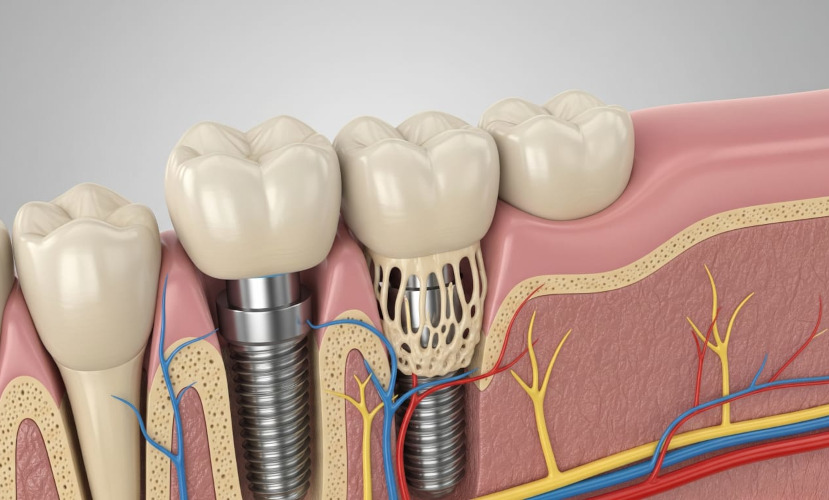8 am to 6 pm (Mon - Fri)
10 am to 8 pm (Sat - Sun)
Dental Implants

Dental Implants
What Are Dental Implants?
Dental implants are artificial tooth roots made of titanium that are surgically placed into the jawbone. They support crowns, bridges, or dentures to replace missing teeth. Implants require healthy gums and sufficient jawbone for successful placement and long-term stability.
Procedure of Dental Implant
Initial Assessment: Dental examination, X-rays, or CBCT scan. Evaluation of bone health and overall medical condition
Surgical Placement of Implant: Under local anesthesia, an implant is placed into the jawbone
Healing Phase: 3 to 6 months for the bone to fuse with the implant. This process provides a strong and stable base
Abutment Placement: A small connector called an abutment is attached to the implant after healing
Crown or Prosthesis Placement: A custom-made crown or artificial tooth is fixed over the abutment

When Implants Are Recommended
One or more missing teeth - To replace individual missing teeth
Teeth lost due to decay, trauma, or periodontal disease - When natural teeth cannot be saved
Difficulty wearing removable dentures - For better stability and comfort
To support a dental bridge without affecting adjacent teeth - Preserves healthy neighboring teeth
Full mouth rehabilitation - Complete restoration of missing teeth

Benefits of Dental Implants
Restores Function Like Natural Teeth - Allows normal chewing and biting
Improves Appearance - Looks and feels like natural teeth
Long-Lasting & Durable - Can last a lifetime with proper care
Prevents Bone Loss - Stimulates jawbone to prevent deterioration
Better Comfort & Convenience - No need for removable dentures
Improves Speech - Restores natural speech patterns

Types of Dental Implants
Endosteal Implants: Most common type, placed directly into the jawbone
Subperiosteal Implants: Placed under the gum but above the jawbone, used when there's insufficient bone
Zygomatic Implants: Placed in the cheekbone when jawbone is insufficient
Care and Maintenance
Oral Hygiene: Regular brushing and flossing, just like natural teeth
Regular Check-ups: Professional cleaning and examination every 6 months
Avoid Hard Foods: Protect implants from excessive force
Quit Smoking: Smoking can affect implant success and longevity
Success Rate and Recovery
Success Rate: Dental implants have a success rate of 95-98% when placed by experienced professionals
Recovery Time: Initial healing takes 3-6 months, but most patients can resume normal activities within a few days
Longevity: With proper care, implants can last 20+ years or even a lifetime
At Crescent 432, we use advanced implant technology and techniques to ensure the best possible outcomes. Our experienced team provides personalized care throughout your implant journey, from initial consultation to final restoration.



